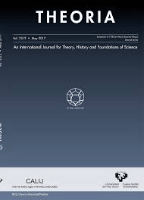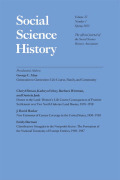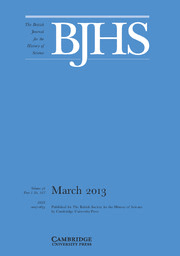
HISTORY OF SCIENCE
metrics 2024
Decoding the Legacy of Scientific Inquiry
Introduction
HISTORY OF SCIENCE, published by SAGE PUBLICATIONS LTD, stands as a pivotal journal in the domain of historical studies, with a focus on the development and evolution of scientific thought and practice throughout history. With an ISSN of 0073-2753 and an E-ISSN of 1753-8564, this journal is recognized for its commitment to high-quality research, as evidenced by its categorization in the Q2 quartile for History and Q3 for History and Philosophy of Science in 2023. Spanning a converged history from 1962 to 2024, the journal serves as an essential platform for scholars, providing in-depth analyses and discussions that foster a deeper understanding of the interplay between science and its historical context. As a well-regarded source in the field, it ranks #140 out of 1760 in Arts and Humanities History and maintains a commendable 92nd percentile ranking, highlighting its influence and reach among researchers and professionals alike. Although not an Open Access journal, it remains accessible to students, scholars, and practitioners in the field, bridging the past and present of scientific inquiry.
Metrics 2024
 0.17
0.17 1.10
1.10 1.20
1.20 33
33Metrics History
Rank 2024
Scopus
IF (Web Of Science)
JCI (Web Of Science)
Quartile History
Similar Journals

Early Science and Medicine
Revealing the Intersections of Knowledge and HealingEarly Science and Medicine is a renowned academic journal published by BRILL, dedicated to exploring the intersections between historical and medical studies. With a distinguished history since its inception in 1996, the journal caters to an interdisciplinary audience, encompassing vital aspects of History, History and Philosophy of Science, and Medicine. It enjoys commendable rankings, being in the Q2 quartile in History, among others, reflecting its significant contribution to these fields. The journal's editorial commitments aim to advance scholarly discussions on the development of medical practices, theories, and their historical contexts, making it an essential resource for researchers, professionals, and students alike. Although currently not open access, Early Science and Medicine offers comprehensive analyses and rich content that engage with and enrich our understanding of the complex relationship between science and medicine throughout history. For more information, you can find the journal at its esteemed address in Leiden, Netherlands.

THEORIA-REVISTA DE TEORIA HISTORIA Y FUNDAMENTOS DE LA CIENCIA
Elevating Understanding of Science's Historical RootsTHEORIA-REVISTA DE TEORIA HISTORIA Y FUNDAMENTOS DE LA CIENCIA, published by the Servicio Editorial Universidad del País Vasco, is a leading open access journal dedicated to advancing the fields of History, Philosophy of Science, and related disciplines since its inception in 2003. With a robust impact factor placing it in the esteemed Q1 and Q2 quartiles in its respective categories, this journal serves as a crucial platform for researchers, professionals, and students who are engaged in profound discussions and analyses of scientific foundations and historical contexts. Based in Spain, THEORIA has consistently demonstrated its commitment to scholarly excellence, achieving notable rankings in Scopus, particularly in the fields of Arts and Humanities, where it holds a rank of #169 in Philosophy and #59 in History and Philosophy of Science. The journal not only allows immediate open access to its diverse range of articles, fostering global knowledge dissemination, but also aims to bridge connections across varied philosophical inquiries and historical explorations within science. Join the dialogue today in shaping the future understanding of our scientific heritage.

ENGLISH HISTORICAL REVIEW
Engaging Minds with Rich Historical ContentThe English Historical Review, published by Oxford University Press, stands as one of the foremost journals in the field of history, with a remarkable legacy that dates back to 1886. With an ISSN of 0013-8266 and an E-ISSN of 1477-4534, the journal serves as a vital platform for the dissemination of scholarly research and critical analysis among historians and researchers alike. It boasts an impressive positioning in the academic landscape, currently ranking in the Q2 category for History and occupying the 60th percentile in the Scopus ranks within the Arts and Humanities. Although it operates under a subscription model, the English Historical Review continues to attract contributions that shape our understanding of historical narratives and methodologies. Researchers, professionals, and students will find its rich content indispensable for both their studies and professional practice, making it a pivotal resource for advancing the discipline of history.

Nuncius-Journal of the History of Science
Connecting Science with Its Historical TapestryNuncius - Journal of the History of Science, published by BRILL, is a vital resource dedicated to the exploration and analysis of the intricate relationship between science and its historical context. Established with the goal of fostering scholarly discussion, this journal serves as a platform for researchers and historians to present their findings and interpretations regarding the evolution of scientific thought. With an impact factor reflective of its academic rigor and ranked in the Q3 category in the field of History and Philosophy of Science, it offers a rich archive of articles spanning converged years from 1986 to 2024. Nuncius encourages submissions that advance the understanding of science's impact on society, culture, and its philosophical underpinnings, making it a key reference for those engaged in the histories that define modern scientific inquiry. Situated in the scholarly landscape of the Netherlands, Nuncius remains an essential read for professionals, students, and academics seeking to deepen their knowledge in this significant field.

SOCIAL SCIENCE HISTORY
Uncovering Societal Transformations, One Article at a TimeSOCIAL SCIENCE HISTORY is a leading interdisciplinary journal that combines insights from history and social science to foster a deeper understanding of societal transformations across time. Published by Société Vaudoise des Sciences Naturelles, this esteemed journal has established itself as a vital platform for scholarly discussion, contributing significantly to the field since its inception in the late 1970s. With a robust Q1 ranking in History and a respectable Q2 ranking in the broader category of Social Sciences, it boasts an impressive impact within the academic community, particularly among researchers focused on historical analysis and socio-cultural studies. The journal covers a diverse range of topics and offers rich, well-researched articles that appeal to scholars at all levels, igniting critical discourse on pertinent historical and social issues. Although it is not an open access journal, the high-quality articles published in SOCIAL SCIENCE HISTORY continue to serve as valuable resources for academia, ensuring its relevance and prominence within the scholarly landscape.

NUOVA RIVISTA STORICA
A Gateway to Nuanced Historical AnalysisNUOVA RIVISTA STORICA is a distinguished journal dedicated to the field of history, published by SOC EDITRICE DANTE ALIGHIERI SRL in Italy. With a long-standing tradition since its inception, the journal has been a pivotal platform for scholarly discourse, illuminating various historical narratives and perspectives. Though it is currently not an open-access publication, NUOVA RIVISTA STORICA provides robust access options for readers and researchers keen on exploring nuanced historical analyses. As demonstrated by its standing in the Q4 quartile of history journals and its ranking of #1425 out of 1760 within the Scopus database, it remains a valuable resource for emerging scholars and seasoned academics alike. The journal's commitment to advancing historical scholarship makes it an essential read for anyone engaged in the study of history, culture, and societal evolution.

History of science and technology
Unlocking the secrets of the past to inform the present.History of Science and Technology is an esteemed open-access journal published by SUIT Publishing, dedicated to advancing knowledge in the interrelated fields of history, science, technology, and their cultural implications. Since its inception in 2013, this journal has served as a vital platform for researchers, professionals, and students, fostering interdisciplinary dialogue and critical discourse on historical developments in science and technology. With an impressive reputation reflected in its 2023 Scopus rankings, where it ranks in the Q2 and Q3 quartiles across multiple related fields, it has positioned itself as a prominent resource in the academic community. The journal is particularly recognized for its contributions to archeology, museology, and the philosophy of science, making it essential reading for those engaged in these domains. Based in Kyiv, Ukraine, and operating under an open-access model, the History of Science and Technology aims to make high-quality research widely accessible, ultimately enriching the historical narrative and encouraging scholarly engagement across disciplines.

BRITISH JOURNAL FOR THE HISTORY OF SCIENCE
Illuminating the evolution of scientific thought.The British Journal for the History of Science is a premier academic publication dedicated to exploring the intricate relationship between science and society throughout history. Published by Cambridge University Press, this journal features a rich blend of original research articles, critical reviews, and scholarly discussions that illuminate the development of scientific ideas and practices from antiquity to the modern era. With a strong reputation reflected in its Q1 classification in History and Q2 in History and Philosophy of Science for 2023, this journal plays an essential role in advancing the field by engaging researchers, professionals, and students alike. The journal's commitment to intellectual rigor and cross-disciplinary dialogue fosters a deeper understanding of how scientific thought has shaped our world. Although it does not offer open access, the journal maintains a strong academic footprint, making significant contributions to historical scholarship. Join a community of scholars who are passionate about unfolding the rich tapestry of scientific history, as the British Journal for the History of Science continues to publish cutting-edge research until 2024.

Dynamis
Fostering Insights Through Historical and Philosophical PerspectivesDynamis is a distinguished journal published by EDITORIAL UNIV GRANADA, focusing on the interdisciplinary fields of History and Philosophy of Science as well as Medicine. Since its inception in 1981, this journal has provided a platform for scholarly discussion and exploration of the evolution of scientific thought and medical practices, with a consistent commitment to enriching academic dialogue up to the year 2024. Operating within the Q4 category for both History and Philosophy of Science and Medicine in the 2023 rankings, it holds a unique niche despite its positioning and aims to amplify underrepresented voices and perspectives via rigorous academic analysis. Although not currently an open-access publication, Dynamis continues to serve as a vital resource for researchers, professionals, and students who are keen to understand the historical contexts and philosophical implications in these fields. Its impact within the academic community is reflected in its Scopus rankings, offering valuable insights into the interplay between history, philosophy, and medicine. Situated in beautiful Granada, Spain, Dynamis remains committed to fostering a deeper understanding of the sciences through a historical and philosophical lens.

Epistemology & Philosophy of Science-Epistemologiya i Filosofiya Nauki
Fostering Scholarly Excellence in Epistemological DiscourseEpistemology & Philosophy of Science-Epistemologiya i Filosofiya Nauki is a prestigious journal published by the Russian Academy of Sciences - Institute of Philosophy, dedicated to advancing the discourse in the fields of epistemology, philosophy of science, and related disciplines. With a distinguished presence in academia, this journal is recognized for its exceptional contributions, evident through its categorization as a Q2 journal in Arts and Humanities and Philosophy, and a Q1 journal in Cultural Studies. Covering an expansive scope from 2017 to 2023, it facilitates a vital dialogue among scholars and professionals aiming to explore the intersections of knowledge, culture, and education. Although currently not open access, the rigorous peer-review process ensures that only high-quality research is published, enriching the intellectual landscape. The journal's commendable rankings in Scopus, particularly in Arts and Humanities and History and Philosophy of Science, reflect its commitment to scholarly excellence. For researchers, educators, and students, Epistemology & Philosophy of Science serves as an essential resource for understanding and contributing to the ongoing philosophical dialogues that shape our comprehension of scientific inquiry.